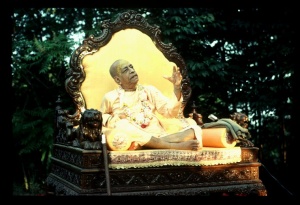CC Madhya 13.61 (1975): Difference between revisions
(Vanibot #0027: CCMirror - Mirror CC's 1996 edition to form a basis for 1975) |
(Vanibot #0020: VersionCompareLinker - added a link to the Version Compare feature) |
||
| Line 2: | Line 2: | ||
<div style="float:left">'''[[Sri Caitanya-caritamrta (1975)|Śrī Caitanya-caritāmṛta (1975)]] - [[CC Madhya (1975)|Madhya-līlā]] - [[CC Madhya 13 (1975)|Chapter 13: The Ecstatic Dancing of the Lord at Ratha-yātrā]]'''</div> | <div style="float:left">'''[[Sri Caitanya-caritamrta (1975)|Śrī Caitanya-caritāmṛta (1975)]] - [[CC Madhya (1975)|Madhya-līlā]] - [[CC Madhya 13 (1975)|Chapter 13: The Ecstatic Dancing of the Lord at Ratha-yātrā]]'''</div> | ||
<div style="float:right">[[File:Go-previous.png|link=CC Madhya 13.60 (1975)|Madhya-līlā 13.60]] '''[[CC Madhya 13.60 (1975)|Madhya-līlā 13.60]] - [[CC Madhya 13.62 (1975)|Madhya-līlā 13.62]]''' [[File:Go-next.png|link=CC Madhya 13.62 (1975)|Madhya-līlā 13.62]]</div> | <div style="float:right">[[File:Go-previous.png|link=CC Madhya 13.60 (1975)|Madhya-līlā 13.60]] '''[[CC Madhya 13.60 (1975)|Madhya-līlā 13.60]] - [[CC Madhya 13.62 (1975)|Madhya-līlā 13.62]]''' [[File:Go-next.png|link=CC Madhya 13.62 (1975)|Madhya-līlā 13.62]]</div> | ||
{{CompareVersions|CC|Madhya 13.61|CC 1975|CC 1996}} | |||
{{RandomImage}} | {{RandomImage}} | ||
==== TEXT 61 ==== | ==== TEXT 61 ==== | ||
<div class="verse"> | <div class="verse"> | ||
:sākṣāte nā deya dekhā, parokṣe | :sākṣāte nā deya dekhā, parokṣe ta' dayā | ||
:ke bujhite pāre caitanya-candrera māyā | :ke bujhite pāre caitanya-candrera māyā | ||
</div> | </div> | ||
| Line 18: | Line 17: | ||
<div class="synonyms"> | <div class="synonyms"> | ||
sākṣāte—directiy; nā—not; deya—gives; dekhā—interview; parokṣe—indirectly; ta'-indeed; dayā—there was mercy; ke—who; bujhite—to understand; pāre—is able; caitanya-candrera—of Lord Śrī Caitanya Mahāprabhu; māyā—internal potency. | |||
</div> | </div> | ||
| Line 25: | Line 24: | ||
<div class="translation"> | <div class="translation"> | ||
Although the King | Although the King was refused an interview, he was indirectly bestowed causeless mercy. Who can understand the internal potency of Śrī Caitanya Mahāprabhu? | ||
</div> | </div> | ||
| Line 32: | Line 31: | ||
<div class="purport"> | <div class="purport"> | ||
As Śrī Caitanya Mahāprabhu was playing the part of a world teacher, He did not agree to see the King | As Śrī Caitanya Mahāprabhu was playing the part of a world teacher, He did not agree to see the King because a king is a mundane person interested in money and women. Indeed, the very name "king" suggests one who is always surrounded by money and women. As a sannyāsī, Śrī Caitanya Mahāprabhu was afraid of both money and women. The very word "king" is repugnant to one who is in the renounced order of life. Śrī Caitanya Mahāprabhu refused to see the King, but indirectly, by the Lord's causeless mercy, the King was able to understand the Lord's mysterious activities. Lord Caitanya Mahāprabhu's activities were exhibited sometimes to reveal Him as the Supreme Personality of Godhead and sometimes to show Him as a devotee. Both kinds of activity are mysterious and appreciated only by pure devotees. | ||
</div> | </div> | ||
Latest revision as of 07:54, 27 January 2020

A.C. Bhaktivedanta Swami Prabhupada
TEXT 61
- sākṣāte nā deya dekhā, parokṣe ta' dayā
- ke bujhite pāre caitanya-candrera māyā
SYNONYMS
sākṣāte—directiy; nā—not; deya—gives; dekhā—interview; parokṣe—indirectly; ta'-indeed; dayā—there was mercy; ke—who; bujhite—to understand; pāre—is able; caitanya-candrera—of Lord Śrī Caitanya Mahāprabhu; māyā—internal potency.
TRANSLATION
Although the King was refused an interview, he was indirectly bestowed causeless mercy. Who can understand the internal potency of Śrī Caitanya Mahāprabhu?
PURPORT
As Śrī Caitanya Mahāprabhu was playing the part of a world teacher, He did not agree to see the King because a king is a mundane person interested in money and women. Indeed, the very name "king" suggests one who is always surrounded by money and women. As a sannyāsī, Śrī Caitanya Mahāprabhu was afraid of both money and women. The very word "king" is repugnant to one who is in the renounced order of life. Śrī Caitanya Mahāprabhu refused to see the King, but indirectly, by the Lord's causeless mercy, the King was able to understand the Lord's mysterious activities. Lord Caitanya Mahāprabhu's activities were exhibited sometimes to reveal Him as the Supreme Personality of Godhead and sometimes to show Him as a devotee. Both kinds of activity are mysterious and appreciated only by pure devotees.